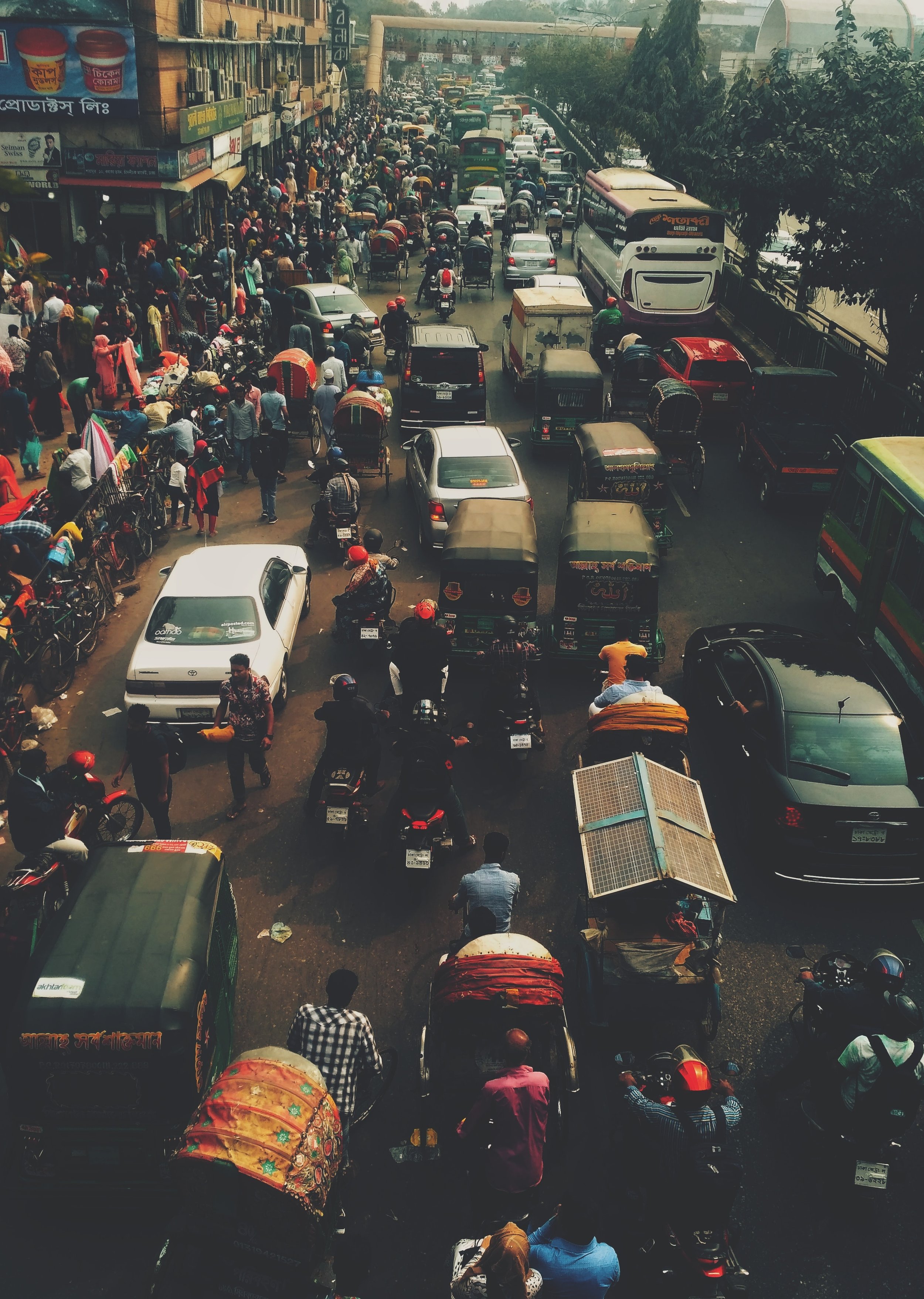
Dhaka - Motorised Mobile Livelihood – The Pick Up Van
Pick up Vans with capacity of 2-3 tonnes are the economic lifeline of Dhaka as they ferry goods and people between farms, markets and warehouses across surrounding districts of the city.
This sector remained operational through the lockdown as some jobs could qualify as essential services, such as selling food from a van. Yet, for pick up van drivers the road to economic recovery and well-being has not been as straight forward. Whereas, earlier most of their income was earned through long haul jobs to the far reaches of Bangladesh, today most jobs are restricted to a 50 kilometre radius around Dhaka. This is because police surveillance and fines have increased and most drivers and businesses fear that they will not be able to return, or worse their van and goods will be confiscated.
The economic downturn has also had an impact on the jobs available, as more businesses have tried to cut down on costs of logistics and transportation especially as Bangladesh’s international borders remain partially closed. In this situation, pick up van drivers who generally earn around 30% of the full income from any trip, have had to work for longer hours with two 5 hours shifts every day. In some cases, women in the households have taken up supplementary jobs while van drivers take on child care in the longer gaps they now have between commissioned work.
In recent times, pick un vans have also become part of the ride-hailing platform business, through apps like Truck Lagbe and Amar Rent a Car. However, platforms tend to focus on home and office moves, with little impact on the real wages of drivers - to meet the attractive charges that the apps promise. Pick up van garage owners tend to be from middle class backgrounds and while their garages may be based in the informal settlements, they do not live there.
The pick up van livelihood is also embedded in ‘grey economies’ as in the day to day operations of transporting goods, van drivers encounter rent-seeking syndicates whether in the form of ‘fixers’ who promise jobs for a cut or they have to bribe the police or have encounters with criminal gangs who loot the van on highways. This mobile livelihood also supports a number of other livelihoods – from packers, to sanitising teams at warehouses, fuel pumps, garage mechanics, toll personnel and pick up stand attendants and managers.

Kobir Hosaain is one such Pick up Van Driver.
Kobir Hossain, aged 34, is a pick up van driver who lives in the Kallyanpur Pora Basti settlement. He moved to Dhaka from Ilaipur village in Khulna districts around 22 years ago. He started out as a helper in a pick up van garage and then worked his way to get a license to drive the pick up van. During the lockdown he did not have any income for a month as the police would stop the vehicle from leaving the settlement. Later, like some of his other colleagues he parked the van on the main road near the settlement and sold fruits and vegetables from there. Occasionally, he took commissioned trips near Dhaka. Trips outside Dhaka remained difficult as would not be able to return home if the police stopped him at the district borders.
Kabir earns around BDT 15,000 ($174) per month and his daily income has dropped from BDT 1000 ($11) to BDT 500 ($5) since the pandemic. He gets paid on a commission basis, wherein for every trip, after deductions for fuel, toll and food costs he gets 30% of the income, 10% goes to the helper who helps him load goods and 80% goes to the owner of the van. Kobir would like to own a van some day, but he would have to take a bank loan for BDT 8 lakhs ($9324) with a down payment of BDT 250,000 ($2911) to be paid back in 32 instalments.
Kobir’s day starts at different times depending on the job he has been commissioned. One shift could start at 11 am and end at 2pm, when he returns home for rest, and then goes back to work at 7pm for a late night shift until midnight. Before the pandemic, he preferred long distance routes as he could make enough money by working for 4 days in a week. Lately, however, most commissions are for short trips of around 50 km, so he has to take more trips to earn enough. This is taking a toll on his health.
Driving a pick up van is a risky business. During the pandemic Kobir and his colleagues took jobs at night as restrictions were not as strictly enforced then and they could bribe the police to get by. But the highways are dangerous as once when Kobir was driving to Sylhet his van was stopped by 8 motorbikes who came in front of his pickup, blocked his way and looted everything from his van.
Kobir can carry 2 to 3 tonnes of goods in his pick up van and usually he gets jobs such as transporting fruits and vegetables from wholesale merchants in neighbouring districts of Dhaka (Manikganj, Jamalpur) to the Mirpur area or he transports goods for different businesses in Bogra and Syedpur. Sometimes he gets jobs through an app called Truck Lagbe, to relocate homes and offices.
